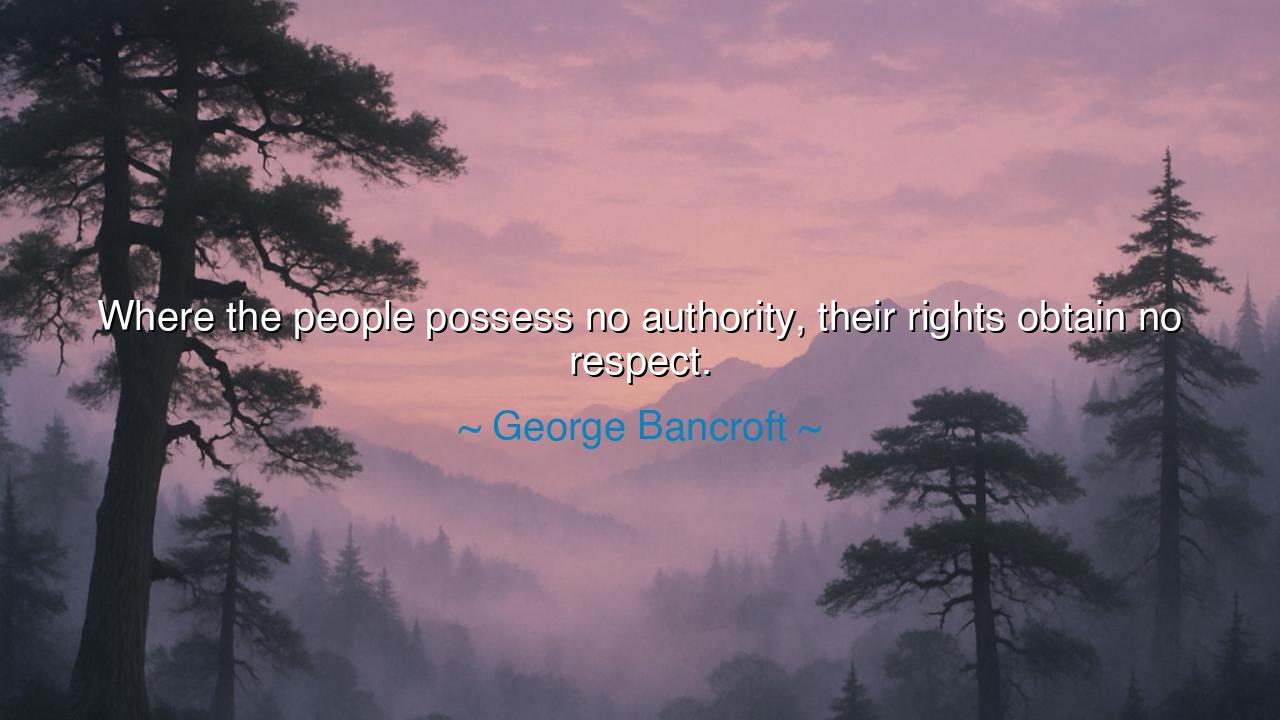
Where the people possess no authority, their rights obtain no






Hear, O seekers of truth, the solemn voice of George Bancroft, historian of a young republic, who declared: “Where the people possess no authority, their rights obtain no respect.” These words are not merely the musings of a scholar, but the thunder of history echoing through time. For rights written on parchment are but shadows if the hand of the people has no power to defend them. Authority without the people becomes tyranny; rights without authority become illusions, fragile as mist in the morning sun.
The origin of this saying lies in the very struggles that birthed nations. Bancroft, who chronicled the rise of the United States, looked back upon centuries when kings and emperors ruled, granting or withholding freedoms at their pleasure. He saw that it was not the benevolence of rulers that preserved liberty, but the strength of the governed to claim and wield it. A people without voice, a people denied authority, are like captives in gilded cages: their “rights” proclaimed, yet trampled without consequence.
Consider, O listener, the tale of Magna Carta in England, in the year of our Lord 1215. The barons, weary of King John’s tyranny, forced him to sign a charter that proclaimed rights and liberties. But what made those words endure was not the ink, but the authority wrested from the crown. For only when the people held power to demand respect could their liberties breathe. Without authority, the document would have been nothing but a king’s broken promise. With authority, it became a seed from which modern freedom grew.
Bancroft’s teaching also calls to mind the fate of peoples who lacked such power. The serfs of medieval Europe toiled under burdens of labor, their lords proclaiming paternal care while extracting their strength. They had no authority, and thus their “rights” were but whispers ignored. Contrast this with the American colonists, who, when denied representation and fair authority, rose in revolution. Their cry was not only for rights, but for the power to protect them. Thus was born a nation where rights were not gifts from rulers but endowments defended by the people themselves.
The wisdom here is both warning and promise. Rights that are not bound to authority are fragile, vulnerable to the whims of those in power. The people must be vigilant, not only cherishing their freedoms but holding fast to the means by which they may enforce them. For wolves respect only strength, and rulers respect only those who may hold them accountable. To forget this is to fall back into servitude, where rights are spoken yet never honored.
O children of tomorrow, take this lesson to heart: do not be lulled by the soothing words of those who promise to safeguard your liberties while stripping away your authority. Remember always that the two are bound as body and soul. Without authority, rights perish; without rights, authority corrupts. Only when the people hold both can justice stand firm.
Practically, let your actions reflect this truth. Participate in the councils of your community. Raise your voice in matters of justice. Guard against complacency, for authority surrendered is rarely returned. Teach your children that freedom is not inherited fully formed but must be nourished by vigilance and courage. In every age, the rights of the people depend upon the authority of the people, and that authority must never be abandoned.
Thus Bancroft’s words resound as a timeless oracle: where the people possess no authority, their rights obtain no respect. Let this be engraved upon your hearts. For rights are not preserved by parchment, nor by promise, but by the living strength of a people who refuse to bow their heads. Stand firm, O heirs of liberty, and guard both your rights and your authority, that the generations after you may walk in freedom’s light.






AAdministratorAdministrator
Welcome, honored guests. Please leave a comment, we will respond soon